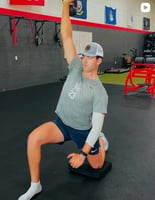Are you an athlete or active individual in San Antonio battling persistent pain, sidelined by...
Maximize Athletic Performance: How BFR Training Reduces Overtraining Risks
For athletes striving to excel in their sport, finding the balance between pushing boundaries and avoiding overtraining is essential. Blood Flow Restriction (BFR) training has emerged as a promising strategy to enhance athletic performance while mitigating the risk of overtraining. In this blog post, we'll explore how BFR training can benefit athletes by optimizing performance, promoting recovery, and reducing the risk of overtraining.
Understanding Overtraining
Overtraining occurs when athletes push their bodies beyond their capacity to recover, leading to a decline in performance, increased injury risk, and psychological burnout. Common signs of overtraining include persistent fatigue, decreased motivation, and impaired performance despite continued training efforts.
The Role of BFR Training in Athletic Performance
BFR training offers athletes a unique approach to optimize performance and reduce the risk of overtraining through several key mechanisms:
- Enhanced Muscle Activation: By restricting blood flow to working muscles, BFR training amplifies muscle activation and recruitment, leading to greater muscle fiber engagement and strength gains.
- Metabolic Stress and Hypertrophy: BFR training induces metabolic stress and muscle fatigue, stimulating muscle hypertrophy and growth hormone release. This hypertrophic response allows athletes to achieve muscle growth and strength gains with lighter loads, reducing the strain on joints and connective tissues.
- Improved Cardiovascular Efficiency: BFR training elicits cardiovascular adaptations such as increased capillary density and enhanced vascular function, improving oxygen delivery and nutrient exchange within muscles. This improved cardiovascular efficiency enhances endurance and performance during prolonged athletic efforts.
Benefits of BFR Training for Athletes
Incorporating BFR training into an athlete's regimen offers several benefits, including:
- Enhanced Strength and Power: BFR training enables athletes to achieve significant gains in muscle strength and power, even with reduced training volumes and intensities.
- Accelerated Recovery: BFR training promotes faster recovery from intense workouts and competitions by enhancing blood flow, nutrient delivery, and waste product removal in recovering muscles.
- Injury Prevention: By reducing the need for high-intensity training loads, BFR training lowers the risk of overuse injuries and musculoskeletal imbalances commonly associated with traditional resistance training.
Strategies for Implementing BFR Training in Athletes
To optimize the benefits of BFR training and reduce the risk of overtraining, athletes should consider the following strategies:
- Periodization: Incorporate BFR training strategically within periodized training cycles to avoid excessive training volume and intensity, allowing adequate recovery between BFR sessions.
- Individualization: Tailor BFR training protocols to each athlete's training status, goals, and tolerance levels, adjusting variables such as cuff pressure, exercise selection, and volume accordingly.
- Monitoring: Regularly assess markers of training load, recovery, and performance to identify signs of overtraining and adjust training protocols as needed to prevent burnout and injury.
Conclusion
Blood Flow Restriction (BFR) training offers athletes a valuable tool for optimizing performance, promoting recovery, and reducing the risk of overtraining. By strategically integrating BFR training into their training regimens, athletes can achieve greater gains in strength, power, and endurance while safeguarding their long-term health and well-being.
Whether you're a professional athlete seeking a competitive edge or an amateur athlete striving for personal excellence, BFR training holds promise as a safe and effective strategy to elevate your athletic performance and reach new heights in your sport.
Unleash Athletic Excellence: Harnessing the Power of BFR Training
BFR training stands as a revolutionary tool for athletes seeking to elevate their performance and achieve their goals. With its ability to stimulate muscle growth, improve strength, and enhance recovery, BFR training offers athletes a competitive edge while reducing the risk of overtraining and injury.
At Puckett Physical Therapy, Dr. Tim Puckett and our dedicated team are committed to helping athletes unlock their full potential through strategic integration of BFR training into their training programs. Whether you're a professional athlete striving for excellence or an amateur athlete aiming to improve, our expertise and personalized approach can guide you toward success.
If you're ready to take your athletic performance to the next level, contact our office at (210) 742-9423 or visit our website to schedule a consultation with our experienced team. Let us help you unleash your athletic potential with BFR training at Puckett Physical Therapy.
Together, we'll embark on a journey toward peak performance, resilience, and achievement. Don't settle for mediocrity—unleash your greatness with BFR training.

_Physical%20Therapy%20in%20San%20Antonio_%20A%20Complete%20Guide%20to%20Recovery%20and%20Performance_November2025_Image1.png?height=200&name=Puckett%20PT%20(Tim%20Puckett)_Physical%20Therapy%20in%20San%20Antonio_%20A%20Complete%20Guide%20to%20Recovery%20and%20Performance_November2025_Image1.png)

